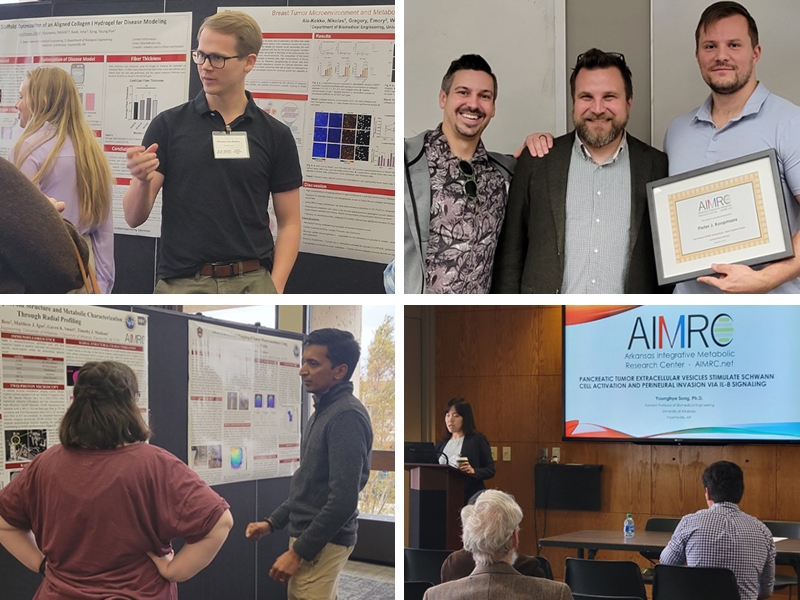
The Arkansas Integrative Metabolic Research Center (AIMRC) marked a significant milestone with its Third Annual Symposium, held on Thursday, Nov. 16, at the Arkansas Union in Fayetteville. The event served as a gathering point, drawing over 70 participants from various departments across the Fayetteville campus and the University of Arkansas for Medical Sciences (UAMS) in Little Rock. This year's symposium showcased a lineup of six speakers, each providing valuable contributions to the field of metabolic research. Attendees had the opportunity to learn about the AIMRC, find out about current research and advancements in metabolic research and explore interdisciplinary collaborative opportunities in biomedical research.
In opening remarks, Kyle Quinn, professor of biomedical engineering and AIMRC director, highlighted recent center achievements, including several recent National Institutes of Health (NIH) awards to center members. Within the Fulbright College of Arts and Sciences, Dr. Xuan Zhuang, assistant professor of biological sciences, received an NIH R15 grant to explore cryptic genetic variation, and Dr. Adam Paré, assistant professor of biological sciences, was awarded a $1.55 million NIH R01 grant to study epithelial metabolism during tissue development. Dr. Kevin Murach, assistant professor in the College of Education and Health Professions, received a $2.5 Million R01 grant to study how exercise can mitigate the decline of muscle function with age. In the College of Engineering, Dr. Jian Zhang, assistant professor of biomedical engineering, was awarded an NIH Trailblazer R21 to characterize and study cell contractility.
Since the AIMRC was established in 2021, AIMRC-supported researchers have received the majority of NIH funding on our campus. "The AIMRC has become the leader in biomedical research on campus by supporting early-stage investigators through an interdisciplinary team of mentors, a variety of funding mechanisms and state-of-the-art research core facilities," Quinn said.
The scientific program of the symposium was kicked off by keynote speaker Dr. Keshav Singh, one of the global leaders in the field of mitochondria research and medicine, and founding editor-in-chief of the journal Mitochondrion. Singh also serves as a professor of genetics, pathology and environmental health, and director of the Cancer Genetics Program at the University of Alabama at Birmingham (UAB). Singh delved into his groundbreaking research on mitochondria in health and disease, providing perspective on a critical aspect of metabolic science.
Adam Paré, assistant professor of biology at the U of A, presented his work on epithelial cell dynamics during embryonic development and discussed new research directions on the role of cellular bioenergetics. In September, Paré graduated from the AIMRC mentoring program for research project leaders upon receipt of his R01 grant. This achievement marked a significant milestone for both his research and the AIMRC project leader program.
Guest speaker Lisa Jansen, an assistant professor with the Department of Dietetics & Nutrition at UAMS, shared her research on leveraging continuous glucose monitoring (CGM) in nutrition research. Her focus on off-label uses in pregnancy and beyond demonstrated the potential for innovative applications in improving metabolic health, particularly in high-risk groups.
In the afternoon, presentations from the three current AIMRC research project leaders Younghye Song, Isabelle R. Miousse and Chenguang Fan showcased the diverse cancer research growing within the AIMRC community. Song, assistant professor of biomedical engineering, discussed her work involving advanced tissue engineering approaches to model the tumor microenvironment. Miousse, assistant professor of biochemistry and molecular biology at UAMS, summarized her work on the use of dietary methionine restriction as a therapeutic strategy for treating cancer. The session was closed out by Fan, associate professor of biochemistry, who provided insights into the role of phosphorylation of isocitrate dehydrogenase in breast cancer.
The symposium concluded with a poster session featuring 27 presenters, which highlighted the diverse range of projects in metabolic research across campus. Pieter J. Koopmans, a graduate student in Murach's laboratory. won the student poster competition for his work on the "Impact of MicroRNA-1 Depletion on Skeletal Muscle Transcriptome in Middle-Aged Mice."
The AIMRC Symposium is held every November, but there are several opportunities throughout the year for researchers to learn about metabolism and explore how the center can support their work. The AIMRC hosts a seminar series that runs during both the fall and spring semesters, which brings in researchers from across the nation. These hosted events provide networking opportunities for both students and faculty to discuss their work with leaders in the field of metabolic research.
The AIMRC maintains research cores in bioenergetics, imaging and spectroscopy, and data science to assist researchers on campus. Expert personnel from each core are available to provide access, training and assistance for a variety of experiments. Multiple mechanisms for seed funding and collaborative opportunities are available through the AIMRC to anyone on campus. With mock review panels, structured mentoring and the full-service proposal development support provided by the AIMRC, researchers are three times more likely to have their NIH proposal funded when compared to non-AIMRC faculty on campus.
The AIMRC was established through a 2021 Center of Biomedical Research Excellence (COBRE) Award from NIGMS (P20GM139768). For more information, please visit the center website at aimrc.uark.edu or contact Kimberley Fuller at fullerk@uark.edu.
Topics
- Education
- Engineering
- Health, Fitness & Wellness
- Lectures, Colloquia & Symposia
- Science
- College of Education and Health Professions
- College of Engineering
- Fulbright College of Arts & Sciences
- Department of Biological Sciences
- Department of Biomedical Engineering
- Exercise Science Research Center
- Exercise Science Program
Contacts
Kimberley Fuller, managing director
Biomedical Engineering | AIMRC
479-575-2333,